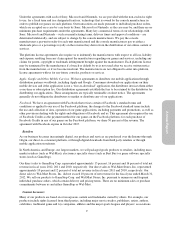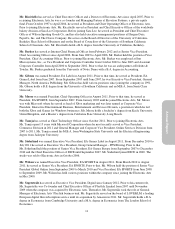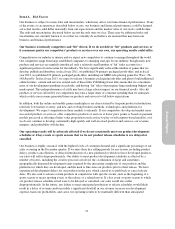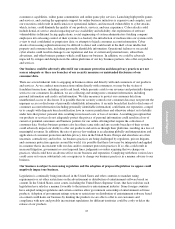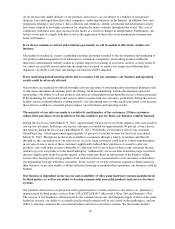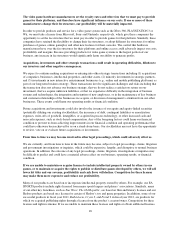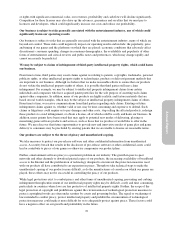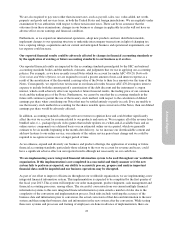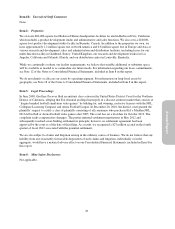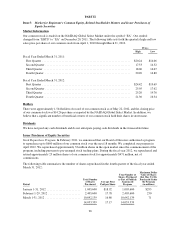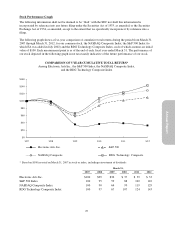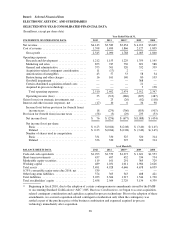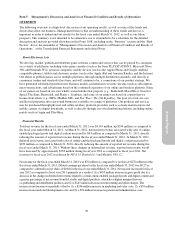Electronic Arts 2012 Annual Report Download - page 103
Download and view the complete annual report
Please find page 103 of the 2012 Electronic Arts annual report below. You can navigate through the pages in the report by either clicking on the pages listed below, or by using the keyword search tool below to find specific information within the annual report.
Annual Report
or rights with significant commercial value, our revenues, profitability and cash flows will decline significantly.
Competition for these licenses may also drive up the advances, guarantees and royalties that we must pay to
licensors and developers, which could significantly increase our costs and reduce our profitability.
Our business is subject to risks generally associated with the entertainment industry, any of which could
significantly harm our operating results.
Our business is subject to risks that are generally associated with the entertainment industry, many of which are
beyond our control. These risks could negatively impact our operating results and include: the popularity, price
and timing of our games and the platforms on which they are played; economic conditions that adversely affect
discretionary consumer spending; changes in consumer demographics; the availability and popularity of other
forms of entertainment; and critical reviews and public tastes and preferences, which may change rapidly and
cannot necessarily be predicted.
We may be subject to claims of infringement of third-party intellectual property rights, which could harm
our business.
From time to time, third parties may assert claims against us relating to patents, copyrights, trademarks, personal
publicity rights, or other intellectual property rights to technologies, products or delivery/payment methods that
are important to our business. Although we believe that we make reasonable efforts to ensure that our products
do not violate the intellectual property rights of others, it is possible that third parties still may claim
infringement. For example, we may be subject to intellectual property infringement claims from certain
individuals and companies who have acquired patent portfolios for the sole purpose of asserting such claims
against other companies. In addition, many of our products are highly realistic and feature materials that are
based on real world examples, which may be the subject of intellectual property infringement claims of others.
From time to time, we receive communications from third parties regarding such claims. Existing or future
infringement claims against us, whether valid or not, may be time consuming and expensive to defend. Such
claims or litigations could require us to pay damages and other costs, stop selling the affected products, redesign
those products to avoid infringement, or obtain a license, all of which could be costly and harm our business. In
addition, many patents have been issued that may apply to potential new modes of delivering, playing or
monetizing game software products and services, such as those that we produce or would like to offer in the
future. We may discover that future opportunities to provide new and innovative modes of game play and game
delivery to consumers may be precluded by existing patents that we are unable to license on reasonable terms.
Our products are subject to the threat of piracy and unauthorized copying.
We take measures to protect our pre-release software and other confidential information from unauthorized
access. A security breach that results in the disclosure of pre-release software or other confidential assets could
lead or contribute to piracy of our games or otherwise compromise our product plans.
Further, entertainment software piracy is a persistent problem in our industry. The growth in peer-to-peer
networks and other channels to download pirated copies of our products, the increasing availability of broadband
access to the Internet and the proliferation of technology designed to circumvent the protection measures used
with our products all have contributed to an expansion in piracy. Though we take technical steps to make the
unauthorized copying of our products more difficult, as do the manufacturers of consoles on which our games are
played, these efforts may not be successful in controlling the piracy of our products.
While legal protections exist to combat piracy and other forms of unauthorized copying, preventing and curbing
infringement through enforcement of our intellectual property rights may be difficult, costly and time consuming,
particularly in countries where laws are less protective of intellectual property rights. Further, the scope of the
legal protection of copyright and prohibitions against the circumvention of technological protection measures to
protect copyrighted works are often under scrutiny by courts and governing bodies. The repeal or weakening of
laws intended to combat piracy, protect intellectual property and prohibit the circumvention of technological
protection measures could make it more difficult for us to adequately protect against piracy. These factors could
have a negative effect on our growth and profitability in the future.
19


